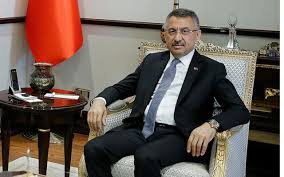Turkish vice president Fuat Oktay said that the United States and Turkey have a “creative opportunity to understand each other” as U.S.-China tensions accelerate.
The U.S.-Turkish relationship has been strained, as both countries find themselves on opposite sides of the Syrian Civil War and other Middle Eastern conflicts. Oktay pitched the coronavirus pandemic and the ensuing economic competition with China as an opportunity to reset the relationship.
“The pre-pandemic global economy was built on a single supply chain, with China at its core,” the Turkish vice president said at a Friday video conference hosted by the Atlantic Council. “For countries like Turkey, with our robust manufacturing sector and our young population, this will be an economic opportunity.”
He claimed that Turkey’s issue-by-issue approach would allow the country to look past its disagreements with the United States over Syria and engage over trade issues.
U.S. forces have backed the Kurdish-led Syrian Democratic Forces in the fight against the Islamic State, also known as ISIS. Turkey considers the SDF a front for Kurdish secessionists within its own borders.
Tensions came to a head in the summer of 2019. U.S. President Donald Trump eventually allowed Turkish troops to carry out a limited offensive against the SDF, and the Trump administration has struck a conciliatory tone with Turkey.
Oktay laid the blame for the tensions squarely on the United States.
“Terrorists started to be treated as legitimate partners,” he said. “You cannot use terrorists to fight another terrorist organization.”
But U.S. attention has moved away from the Middle East and towards “great power competition” with China, a shift that has only accelerated with the coronavirus pandemic.
A new White House strategy document released last month named China’s “predatory economic practices” and “supply chain threats” as some of the greatest threats to U.S. security.
“The pandemic busted certain myths,” Oktay said. “All the countries leading for globalization suddenly became a nation-state.”
He emphasized that “nation-states were uniquely able to provide certain services,” and that “a new definition of national power is desperately needed.”
Oktay predicted that the “slow and painful” process of “decoupling” from China would create areas of common interest with the United States.
But he also claimed that the Turkish nation does not see themselves in terms of whether Turks “do belong, or should belong, or have to belong to one of those power centers.”
Matthew Petti is a national security reporter at the National Interest. Follow him on Twitter: @matthew_petti.
Excerpt only, visit the link to read the entire article
